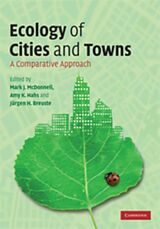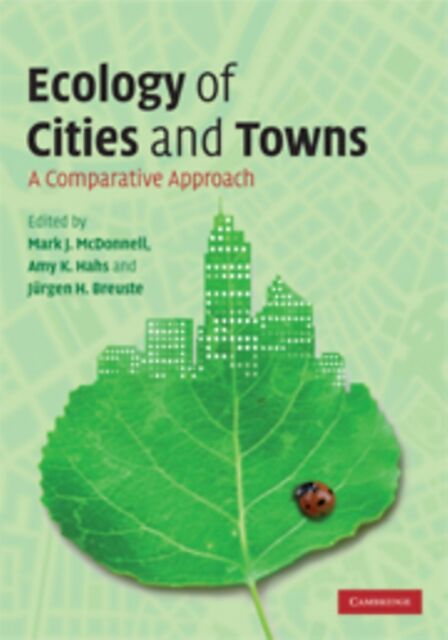Ecology of Cities and Towns
Einband:
Fester Einband
EAN:
9780521861120
Untertitel:
A Comparative Approach
Autor:
Mark J. (Royal Botanic Gardens, Melbour Mcdonnell
Herausgeber:
Cambridge University Press
Anzahl Seiten:
746
Erscheinungsdatum:
26.04.2011
ISBN:
0521861128
Informationen zum Autor Mark J. McDonnell is the Director of the Australian Research Centre for Urban Ecology at the Royal Botanic Gardens in Melbourne! and an Associate Professor in the School of Botany at the University of Melbourne. Amy K. Hahs is a GIS Ecologist at the Australian Research Centre for Urban Ecology at the Royal Botanic Gardens in Melbourne! and a Research Fellow in the School of Botany at the University of Melbourne. Jurgen H. Breuste is a Professor of Geography in the Department of Geography and Geology at the University of Salzburg in Austria. Klappentext Assesses the current status, and future challenges and opportunities, of the ecological study, design and management of cities and towns. Zusammenfassung This book brings together leading scientists! landscape designers and planners from developed and developing countries around the world! to explore how urban ecological research has been undertaken to date! what has been learnt! where there are gaps in knowledge! and what the future challenges and opportunities are. Inhaltsverzeichnis 1. Introduction: scope of the book and the need for developing a comparative approach to the ecological study of cities and towns; Part I. Opportunities and Challenges of Conducting Comparative Studies: 2. Comparative urban ecology: challenges and possibilities; 3. Frameworks for urban ecosystem studies: gradients, patch dynamics and the human ecosystem in the New York metropolitan area and Baltimore, USA; 4. Comparative effects of urbanisation in marine and terrestrial habitats; 5. Comparative ecology of cities and towns: past, present and future; 6. Comparative urban ecological research in developing countries; 7. Using models to compare the ecology of cities; Part II. Ecological Studies of Cities and Towns; 8. Responses of faunal assemblages to urbanisation: global research paradigms and an avian case study; 9. Effect of urban structures on diversity of marine species; 10. Comparative studies of terrestrial vertebrates in urban areas; 11. The ecology of roads in urban and urbanising landscapes; 12. Spatial pattern and process in urban animal communities; 13. Invertebrate biodiversity in urban landscapes: assessing remnant habitat and its restoration; 14. Arthropods in urban ecosystems: community patterns as functions of anthropogenic land use; 15. Light pollution and the impact of artificial night lighting on insects; 16. A comparison of vegetation cover in Beijing and Shanghai: a remote sensing approach; 17. Vegetation composition and structure of forest patches along urban-to-rural gradients; 18. Environmental, social and spatial determinants of urban arboreal character in Auckland, New Zealand; 19. Carbon and nitrogen cycling in soils of remnant forests along urban-rural gradients: case studies in the New York metropolitan area and Louisville, Kentucky; 20. Investigative approaches of urban biogeochemical cycles: New York metropolitan area and Baltimore as case studies; Part III. Integrating Science with Management and Planning: 21. Structural analysis of urban landscapes for landscape management in German cities; 22. Preservation of original natural vegetation in urban areas: an overview; 23. Homogeneity of urban biotopes and similarity of landscape design language in former colonial cities; 24. Tools to assess human impact on biotope resilience and biodiversity in urban planning: examples from Stockholm, Sweden; 25. Landscape ecological analysis and assessment in an urbanising environment; 26. Applying landscape ecological principles to a fascinating landscape: the city; 27. A trans-disciplinary research approach providing a platform for improved urban design, quality of life and biodiverse urban ecosystems; 28. Pattern: process metaphors for metropolitan landscapes; 29. Valuing urban wetlands: modification, preservation and restoration; Part IV. Comments and Synthesis: 30. What is the main object of...
Klappentext
Assesses the current status, and future challenges and opportunities, of the ecological study, design and management of cities and towns.
Zusammenfassung
This book brings together leading scientists, landscape designers and planners from developed and developing countries around the world, to explore how urban ecological research has been undertaken to date, what has been learnt, where there are gaps in knowledge, and what the future challenges and opportunities are.
Inhalt
1. Introduction: scope of the book and the need for developing a comparative approach to the ecological study of cities and towns; Part I. Opportunities and Challenges of Conducting Comparative Studies: 2. Comparative urban ecology: challenges and possibilities; 3. Frameworks for urban ecosystem studies: gradients, patch dynamics and the human ecosystem in the New York metropolitan area and Baltimore, USA; 4. Comparative effects of urbanisation in marine and terrestrial habitats; 5. Comparative ecology of cities and towns: past, present and future; 6. Comparative urban ecological research in developing countries; 7. Using models to compare the ecology of cities; Part II. Ecological Studies of Cities and Towns; 8. Responses of faunal assemblages to urbanisation: global research paradigms and an avian case study; 9. Effect of urban structures on diversity of marine species; 10. Comparative studies of terrestrial vertebrates in urban areas; 11. The ecology of roads in urban and urbanising landscapes; 12. Spatial pattern and process in urban animal communities; 13. Invertebrate biodiversity in urban landscapes: assessing remnant habitat and its restoration; 14. Arthropods in urban ecosystems: community patterns as functions of anthropogenic land use; 15. Light pollution and the impact of artificial night lighting on insects; 16. A comparison of vegetation cover in Beijing and Shanghai: a remote sensing approach; 17. Vegetation composition and structure of forest patches along urban-to-rural gradients; 18. Environmental, social and spatial determinants of urban arboreal character in Auckland, New Zealand; 19. Carbon and nitrogen cycling in soils of remnant forests along urban-rural gradients: case studies in the New York metropolitan area and Louisville, Kentucky; 20. Investigative approaches of urban biogeochemical cycles: New York metropolitan area and Baltimore as case studies; Part III. Integrating Science with Management and Planning: 21. Structural analysis of urban landscapes for landscape management in German cities; 22. Preservation of original natural vegetation in urban areas: an overview; 23. Homogeneity of urban biotopes and similarity of landscape design language in former colonial cities; 24. Tools to assess human impact on biotope resilience and biodiversity in urban planning: examples from Stockholm, Sweden; 25. Landscape ecological analysis and assessment in an urbanising environment; 26. Applying landscape ecological principles to a fascinating landscape: the city; 27. A trans-disciplinary research approach providing a platform for improved urban design, quality of life and biodiverse urban ecosystems; 28. Pattern: process metaphors for metropolitan landscapes; 29. Valuing urban wetlands: modification, preservation and restoration; Part IV. Comments and Synthesis: 30. What is the main object of urban ecology? Determining demarcation using the example of research into urban flora; 31. How to conduct comparative urban ecological research; 32. Ecological scientific knowledge in urban and land-use planning; 33. Envisioning the comparative possible: a critique; 34. Towards a comparative ecology of cities and towns; 35. A comparative ecology of cities and towns: synthesis of opportunities and limitations.

Leider konnten wir für diesen Artikel keine Preise ermitteln ...
billigbuch.ch sucht jetzt für Sie die besten Angebote ...
Die aktuellen Verkaufspreise von 6 Onlineshops werden in Realtime abgefragt.
Sie können das gewünschte Produkt anschliessend direkt beim Anbieter Ihrer Wahl bestellen.
Loading...
Die aktuellen Verkaufspreise von 6 Onlineshops werden in Realtime abgefragt.
Sie können das gewünschte Produkt anschliessend direkt beim Anbieter Ihrer Wahl bestellen.
| # | Onlineshop | Preis CHF | Versand CHF | Total CHF | ||
|---|---|---|---|---|---|---|
| 1 | Seller | 0.00 | 0.00 | 0.00 |
